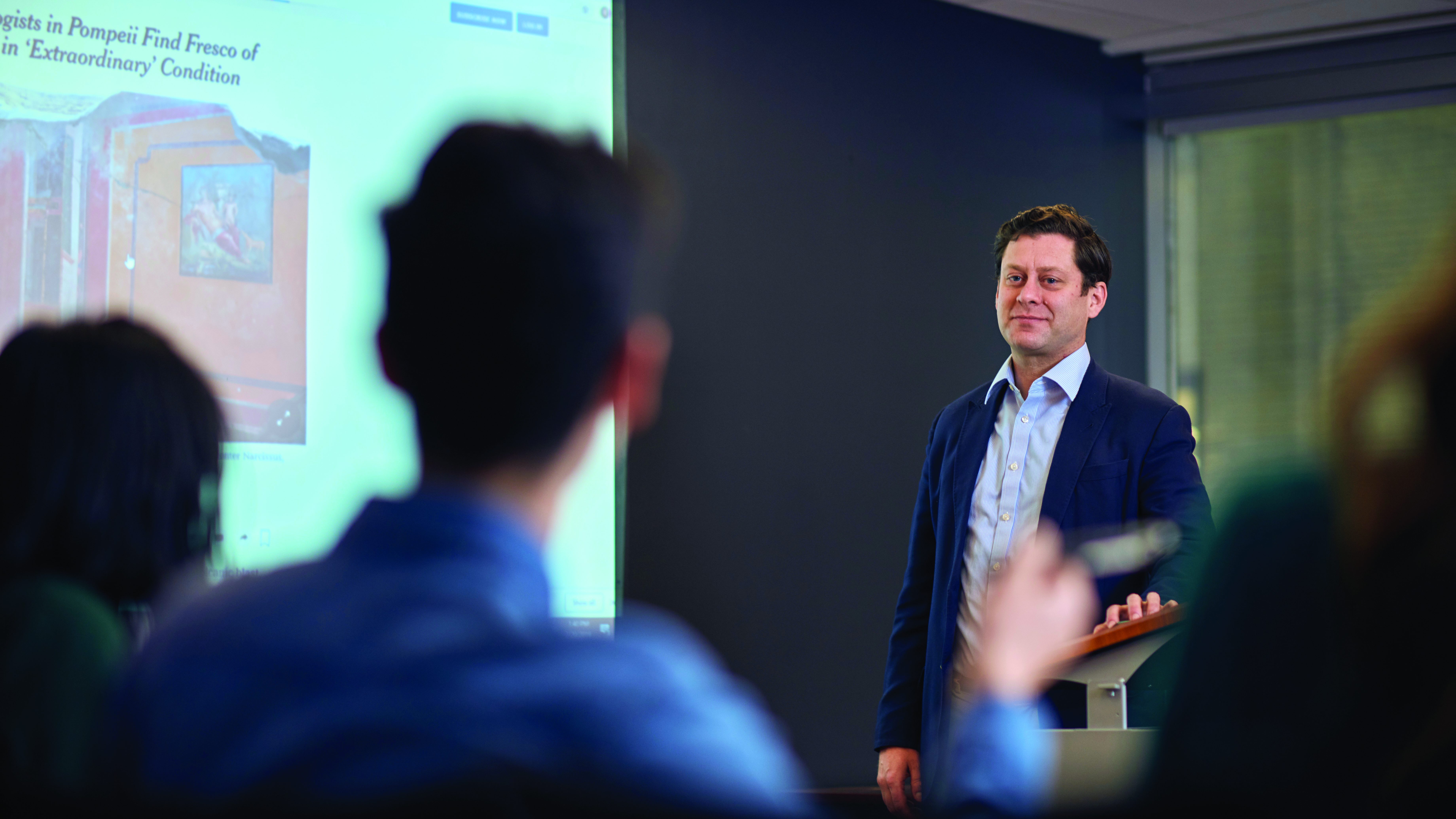A Resurrection of Latin at King’s
With the support of the faculty and Provost, Kinlaw has offered Latin for two out of the three years he has been at King’s.

A Latin revival is happening at The King’s College.
Latin courses have been offered in the past at King’s, but course offerings were irregular and were eventually eliminated altogether. Dr. Joshua Kinlaw, assistant professor of history and humanities, is working to resurrect those abandoned courses. With the support of the faculty and Provost, Kinlaw has offered Latin for two out of the three years he has been at King’s. Why this resurrection? Well, among other things, Kinlaw explains: “It’s difficult to call yourself a liberal arts college without attending to the study of the great Western heritage of languages.”
Thus far, these revived courses have been received with great energy and receptivity. Already, two students have taken their studies further. After graduating from King’s in spring 2019, one student is in the classics baccalaureate program at Columbia and another is at a classics program in St. Andrews, Scotland. Ecce signum!
From a practical standpoint, studying Latin is linked with increased performance on graduate tests, and employers find Latin study an attractive asset, implying a sharp problem solver with intellectual energy. Caitlyn Limbaugh (Humanities ’21) said that “Learning the basics of Latin grammar and vocabulary is no simple task, but doing so has shown me how widespread the influence of Latin is in so many different spheres of our lives. For example, it’s very exciting to see the words et cetera, which are used so commonly in English vernacular, and to understand exactly what they mean in Latin and why we use them today.” (Et cetera, by the way, translates “and the others.” And yes, it’s “et” not “ex”—a common mistake.)
Abby Tilly (MCA ’20) explained: “I decided to take Latin because I want to go into the classics, and to get a master’s degree in them, you have to know Latin and Greek. I also thought it would be a good idea for furthering my language skills, and in turn my entire academic skills. I want to take the full year of Latin, then go on to study more with the firm foundation laid out by Dr. Kinlaw.” Caitlyn Limbaugh shared similar thoughts: “Though I haven’t settled on the idea of attending graduate school, it is an avenue that I feel I should keep open.”
But, this course is not just for graduate school-oriented students. Studying Latin allows any student to master English and appreciate literature and history. After all, English-speakers are quasi Latin-speakers (quasi deriving from the Latin, “as if, almost”). While Latin is technically a “dead language,” it never really died. It was rather reincarnated in the Romance languages and inherited after that. Percentiles, alibis, and impromptus (and many of their brothers and sisters) are still alive and well in English-speaking culture. For all the students perplexed about writing “ibid” in research paper bibliographies, this course would teach them that the word is not arbitrary at all; ibid is actually an abbreviation for the full Latin word, ibidem, which means “in the same place (in a book).” Studying Latin trains students to be more careful readers, who recognize the larger world of languages and can appreciate the Western heritage.
According to Kinlaw the next natural step in growing the Latin offerings would be establishing a second year course. This course would entail reading groups, where students advance from grammar to actual reading of classical texts. Also, because of a growing Latin energy on a national scale, there are extracurricular potentials in spoken Latin. At the moment, Kinlaw offers a small Latin reading group for interested students. While the courses are currently offered to all majors, Kinlaw hopes to establish them as distinctive to the Humanities major.
King’s is notably a liberal arts college and King’s curriculum bursts with classical texts. Thus, Latin is regularly encountered: Interregnum, Pax Romana, lex talionis, sui generis, Magna Carta, in medias res, quid pro quo, cogito ergo sum, and, of course, Julius Caesar’s iconic line, “Veni, vidi, vici.” Latin study allows for an enriched academic experience, in which students can engage culture with more sophistication. Considering the healthy growth in student interest already, the future of Latin at King’s is looking bright.




